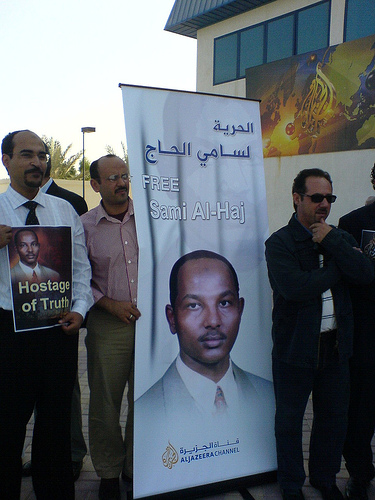Incident: Ibn al-Sheikh al-Libi gives bad intelligence
At this address, Powell refers to al-Libi and states:
I can trace the story of a senior terrorist operative telling how Iraq provided training in these weapons to al Qaeda. Fortunately, this operative is now detained, and he has told his story. I will relate it to you now as he, himself, described it.However on 01 August 2004, the Washington Post will report that Ibn al-Shaykh al-Libi later changed his story, and will imply that he might have been subjected to "enhanced interrogation methods".This senior al Qaeda terrorist was responsible for one of al Qaeda's training camps in Afghanistan...
He says bin Laden and his top deputy in Afghanistan, deceased al Qaeda leader Mohammed Atef, did not believe that al Qaeda labs in Afghanistan were capable enough to manufacture these chemical or biological agents. They needed to go somewhere else. They had to look outside of Afghanistan for help. Where did they go? Where did they look? They went to Iraq.
The support that (inaudible) describes included Iraq offering chemical or biological weapons training for two al Qaeda associates beginning in December 2000. He says that a militant known as Abu Abdula Al-Iraqi (ph) had been sent to Iraq several times between 1997and 2000 for help in acquiring poisons and gases. Abdula Al- Iraqi (ph) characterized the relationship he forged with Iraqi officials as successful.
In February 2005, an article in The New Yorker will be much more explicit. In response to the allegation that al-Libi lied to interrogators, Dan Coleman, a retired FBI agent, will be quoted as saying:
I could have told them that.The issue of the misleading intelligence will all but disappear until 05 November 2005, when Senator Levin (D-Michigan) will share declassified portions of a Defense Intelligence Agency document (labelled DITSUM No. 044-02, written February 2002) with the New York Times. The NYT will report that the document voiced doubts about the credibility of al-Libi's claims.He [al-Libi] ran a training camp. He wouldn't have had anything to do with Iraq. Administration officials were always pushing us to come up with links, but there weren't any. The reason they got bad information is that they beat it out of him. You never get good information from someone that way.
The New York Times states
In outlining reasons for its skepticism, the D.I.A. report noted that Mr. Libi's claims lacked specific details about the Iraqis involved, the illicit weapons used and the location where the training was to have taken place.The article also states that another classified CIA assessment written around the same time states "the source was not in a position to know if any training had taken place", which compares well with Dan Coleman's criticisms above."It is possible he does not know any further details; it is more likely this individual is intentionally misleading the debriefers," the February 2002 report said. "Ibn al-Shaykh has been undergoing debriefs for several weeks and may be describing scenarios to the debriefers that he knows will retain their interest."
The Novermber article does not speculate if al-Libi's motive for misleading the interrogators was because he was being tortured, noting only that "The D.I.A. document gave no indication of ... what interrogation methods were used on him".
In December 2005, the New York Times will write another article, this time addressing the torture aspect of al-Libi's deception. They will quote anonymous current and former government officials saying that al-Libi fabricated his statements to escape harsh treatment meted out to him in Egypt at the US's behest.
(Note: The prisoner is variously referred to as Ibn al-Shaykh al-Libi, and Ibn al-Shaykh.)






